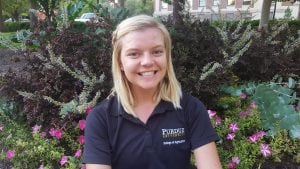More Than My Disability

By: Ashley Dittman
When I was 15 years old, I began having frequent and horrible headaches. By the time I was 16 I was diagnosed with chronic migraines. When people think of disabilities, migraines are not usually what come to mind or even thought of as a disability. However, migraines are the 6th most debilitating illness in the world.* A migraine headache is defined as an extremely incapacitating collection of neurological symptoms that usually includes a severe throbbing recurring pain on one side of the head*, but most people just think it is a really bad headache. In school, it has always been hard to find people that understand what I am going through and that are accommodating. In high school, they did not believe that migraines were a good enough excuse to miss the amount of school I missed. Now in college, I am registered as a student with a disability that has special accommodations, but still some professors are not willing to understand.
Learning from hardships
Although there is a lot of frustration and hardship with my disability, I am thankful for what it has taught me. Missing class is never fun, and missing class because you are at home in bed with all the lights off, a pillow over your head, and in excruciating pain is even worse. The hardships I encounter only push me to be a better student. I miss a lot of class, but because of this I know I have to work hard to not get behind.
Partnering with professors
Most students don’t attempt to make relationships with their professors, but in order to stay up to date on everything, I must. These relationships are beneficial not only with my accommodations, but looking toward the future, like when I need letters of recommendations. I want to show my professors I am more than my disability.
Maintaining good time management
I probably would procrastinate more if I didn’t have migraines, but with them I have to use good time management skills because I never know when one will strike. I use the free help resources that many students don’t take advantage of; it has been beneficial in helping me understand what I have missed. Even if you don’t have a disability, establishing good relationships with professors and maintaining good time management are helpful in succeeding in the long run. You never know when something could come up and you would already be prepared because you are ahead or you can easily contact your professor. There are so many times when I have wished that I didn’t have this disability, but now that I reflect on it, some good things that have happened because of it.
Looking for the silver lining
If you have a disability or know someone with a disability, I know that it can be frustrating that people don’t understand. Don’t let that stop you. Power through and stop to think about the silver lining in your disability. Whatever you do, don’t be ashamed of it. You’re not alone and you’re not the only one going through this. Talk to people to help them understand. Show others that you are hardworking. Don’t let your disability define you. You can do anything. If you don’t have a disability, try to understand those that do and what they go through. Don’t belittle them or ask why they are never in class, but instead celebrate the little victories with them. They are not their disabilities.
*Source: https://migraineresearchfoundation.org/about-migraine/what-is-migraine/

About the author
Ashley Dittman is a junior studying Environmental Science with a concentration in water quality at Purdue University. She hopes to research the effects of pollution on the marine environment. She is a huge Disney fan and loves to go to Disney World Orlando. She loves being with her family, friends, and her dog Minnie. Fun fact about Ashley is she just returned from her study abroad trip to Sydney, Australia where she was able to scuba dive in the Great Barrier Reef. Ashley is also a Pearson Campus Ambassador and loves all the cool programs she can do through Pearson.
This is Ashley’s first contribution to the Pearson Students Blog. If you are a college student and interested in writing for us – click here to pitch your idea and get started!